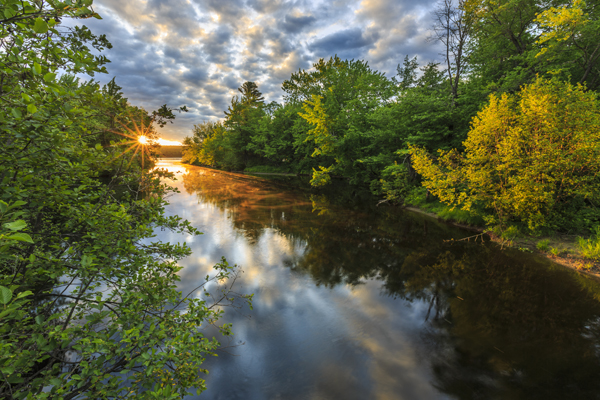We’re blessed with our beautiful brooks, steams, rivers, ponds and lakes — but there is still a lot of work to do to clean them up.
Thankfully, we don’t have the severe problems that folks suffer in the Western states.
Every day, 50 million gallons of water full of arsenic, lead and other toxic metals flow from contaminated mining sites into waterways from Montana to California. The contaminated water poisons aquatic life and taints drinking water.
In some places, it’s estimated it will take 1,000 years before this tragedy ends. And the mining companies have no responsibility to clean up their sites, so all efforts to clean this water is funded by taxpayers.
This makes our challenges in Maine seem very doable. Those challenges include keeping invasive plants and fish species out of our waters, and cleaning fishing lures from the bottom of those waters.
I applaud the efforts of so many Mainers who work diligently to keep out or remove invasive plant species from our waters. I’m worried that no similar effort has been made to rid our waters of invasive fish, many of which were stocked illegally.
My favorite local lake, which was once one of Maine’s best landlocked salmon waters, is now full of nine kinds of invasive fish, dominated by northern pike. And the salmon are gone. Very sad.
Our house is bordered by a lake, brook, pond and stream — and all are very special places where I’ve spent a lot of time fishing. But it really bothered me last summer when the brook and stream stopped flowing for about six weeks; that had not happened in our 40 years here.
The stream is home to everything from snapping turtle and water snakes to beaver, otters, fishers, muskrats, lots of ducks, and more. It’s a wild kingdom! My office and desk overlook the stream, and it’s always entertaining to look up from what I am writing to see what’s in the stream.
I’m assuming that the no-flow is going to be a growing problem because of the changing climate — yet another thing we really must take seriously.
Sen. Paul Davis, R-Sangerville, sponsored legislation this session to require biodegradable rubber fishing lures for freshwater fishing. His bill would also ban stainless steel hooks. The bill would allow five years to achieve his goal. Lots of fish are ingesting these rubber and other lures and sinkers.
Cameron Patterson, a college student from Oakland, testified in favor of the bill with a great story. As his Eagle Scout project, Cameron decided to clean up the bottom of Tricky Pond in Naples. Tricky Pond had already been awarded the title of “Cleanest Body of Water in Maine,” which makes Cameron’s project even more amazing.
With help and guidance from the Department of Inland Fisheries & Wildlife, and participation by a bunch of scouts, Cameron cleaned 22 pounds of fishing lures and sinkers from the bottom of a one-mile section of the pond. Imagine how much fishing gear could be in other lakes and ponds if the cleanest water in Maine has this much!
Many years ago, the Legislature debated — for two sessions — a ban on lead sinkers proposed by Maine Audubon. On behalf of the Sportsman’s Alliance of Maine, I opposed the bill in the first session, and we defeated it.
But two years later, when Audubon proposed the ban again, we supported it, recognizing that there were plenty of good alternatives to lead sinkers. One thing that changed my mind was the death of a loon in the lake behind my house after the loon ingested a lead sinker. We got the loon to Avian Haven, but they could not save it.
I also remember, at the hearing on the lead sinker bill, a guy offered photos of a popular fishing spot where the lake bottom was covered in lures and sinkers.
We need to launch a statewide project to clean our lakes and ponds of lures and sinkers. Perhaps our lake associations and hunting or fishing clubs can take the lead on this. We also need the industry to step up with more biodegradable lures.
And just in case you want to celebrate Maine’s clean waters, please consider this. Freshly caught freshwater fish may be delicious but we are warned not to overindulge because of mercury, dioxin, DDT and PCBs that can be found in Maine waters. The state advises against eating more than quite small amounts; pregnant women are told not to eat any fish.
Yes, we are blessed with lots of beautiful waters. Let’s do everything we can to make them cleaner and keep them beautiful.
George Smith can be reached at 34 Blake Hill Road, Mount Vernon 04352, or georgesmithmaine@gmail.com. Read more of Smith’s writings at www.georgesmithmaine.com.
Send questions/comments to the editors.



Success. Please wait for the page to reload. If the page does not reload within 5 seconds, please refresh the page.
Enter your email and password to access comments.
Hi, to comment on stories you must . This profile is in addition to your subscription and website login.
Already have a commenting profile? .
Invalid username/password.
Please check your email to confirm and complete your registration.
Only subscribers are eligible to post comments. Please subscribe or login first for digital access. Here’s why.
Use the form below to reset your password. When you've submitted your account email, we will send an email with a reset code.